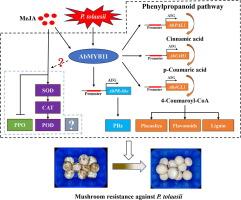当前位置:
X-MOL 学术
›
J. Adv. Res.
›
论文详情
Our official English website, www.x-mol.net, welcomes your
feedback! (Note: you will need to create a separate account there.)
A 3R-MYB transcription factor is involved in Methyl Jasmonate-Induced disease resistance in Agaricus bisporus and has implications for disease resistance in Arabidopsis
Journal of Advanced Research ( IF 11.4 ) Pub Date : 2024-09-02 , DOI: 10.1016/j.jare.2024.08.037 Shuai Yuan 1 , Hanyue Jiang 1 , Yating Wang 1 , Lei Zhang 1 , Zixuan Shi 1 , Lu Jiao 1 , Demei Meng 1
中文翻译:

3R-MYB 转录因子参与双孢蘑菇茉莉酸甲酯诱导的抗病性,并对拟南芥的抗病性有影响
茉莉酸甲酯 (MeJA) 和 MYB 转录因子 (TFs) 在几种植物的病原体抗性中起重要作用,但 MYB TFs 与 MeJA 诱导的食用蘑菇中对 Pseudomonas tolaasii 的防御仍然未知。
研究新型 3R-MYB 转录因子 (AbMYB11) 在 MeJA 诱导的双孢蘑菇抗病性和转基因拟南芥对 P. tolaasii 的抗性中的作用。
用 MeJA 单独或与苯丙烷通路抑制剂联合处理蘑菇,测定处理对蘑菇疾病相关和生理指标的影响,以评估 MeJA 在诱导耐药性中的作用以及所涉及的苯丙烷途径的重要性。进行亚细胞定位、基因表达分析、双荧光素酶报告基因测定、电泳迁移率变化测定和转基因拟南芥实验,阐明 AbMYB11 调控抗病性的分子机制。
MeJA 应用大大提高了蘑菇对 P. tolaasii 感染的抵抗力,而抑制苯丙烷途径显着减弱了这种作用。MeJA 处理刺激了苯丙烷类代谢物的积累,伴随着生物合成酶活性的增加和苯丙烷途径相关基因 (AbPAL1、Ab4CL1、AbC4H1) 和 AbPR 样基因的表达,进一步证实了苯丙烷途径在 MeJA 诱导的对 P. tolaasii 的反应中的关键作用.重要的是,位于 P. tolaasii 感染下的 MeJA 处理迅速诱导了位于细胞核中的 AbMYB11;它转录激活苯丙烷通路相关和 AbPR 样基因,AbMYB11 在拟南芥中的过表达显著增加了苯丙烷相关基因的转录,总酚和黄酮的积累,提高了对 P. tolaasii 的抗性。
本研究通过调节苯丙烷通路阐明了 AbMYB11 作为抗病性调节因子的关键作用,为培育高度抗病的食用蘑菇和植物提供了新的思路。
更新日期:2024-09-02
Journal of Advanced Research ( IF 11.4 ) Pub Date : 2024-09-02 , DOI: 10.1016/j.jare.2024.08.037 Shuai Yuan 1 , Hanyue Jiang 1 , Yating Wang 1 , Lei Zhang 1 , Zixuan Shi 1 , Lu Jiao 1 , Demei Meng 1
Affiliation

|
Introduction
Methyl jasmonate (MeJA) and MYB transcription factors (TFs) play important roles in pathogen resistance in several plants, but MYB TFs in conjunction with MeJA-induced defense against Pseudomonas tolaasii in edible mushrooms remain unknown.Objectives
To investigate the role of a novel 3R-MYB transcription factor (AbMYB11) in MeJA-induced disease resistance of Agaricus bisporus and in the resistance of transgenic Arabidopsis to P. tolaasii.Methods
Mushrooms were treated with MeJA alone or in combination with phenylpropanoid pathway inhibitors, and the effects of the treatments on the disease-related and physiological indicators of the mushrooms were determined to assess the role of MeJA in inducing resistance and the importance of the phenylpropanoid pathway involved. Subcellular localization, gene expression analysis, dual-luciferase reporter assay, electrophoretic mobility shift assay, and transgenic Arabidopsis experiments were performed to elucidate the molecular mechanism of AbMYB11 in regulating disease resistance.Results
MeJA application greatly improved mushroom resistance to P. tolaasii infection, and suppression of the phenylpropanoid pathway significantly weakened this effect. MeJA treatment stimulated the accumulation of phenylpropanoid metabolites, which was accompanied by increased the activities of biosynthetic enzymes and the expression of phenylpropanoid pathway-related genes (AbPAL1, Ab4CL1, AbC4H1) and an AbPR-like gene, further confirming the critical role of the phenylpropanoid pathway in MeJA-induced responses to P. tolaasii. Importantly, AbMYB11, localized in the nucleus, was rapidly induced by MeJA treatment under P. tolaasii infection; it transcriptionally activated the phenylpropanoid pathway-related and AbPR-like genes, and AbMYB11 overexpression in Arabidopsis significantly increased the transcription of phenylpropanoid-related genes, the accumulation of total phenolics and flavonoids, and improved resistance to P. tolaasii.Conclusion
This study clarified the pivotal role of AbMYB11 as a regulator in disease resistance by modulating the phenylpropanoid pathway, providing a novel idea for the breeding of highly disease-resistant edible mushrooms and plants.中文翻译:

3R-MYB 转录因子参与双孢蘑菇茉莉酸甲酯诱导的抗病性,并对拟南芥的抗病性有影响
介绍
茉莉酸甲酯 (MeJA) 和 MYB 转录因子 (TFs) 在几种植物的病原体抗性中起重要作用,但 MYB TFs 与 MeJA 诱导的食用蘑菇中对 Pseudomonas tolaasii 的防御仍然未知。
目标
研究新型 3R-MYB 转录因子 (AbMYB11) 在 MeJA 诱导的双孢蘑菇抗病性和转基因拟南芥对 P. tolaasii 的抗性中的作用。
方法
用 MeJA 单独或与苯丙烷通路抑制剂联合处理蘑菇,测定处理对蘑菇疾病相关和生理指标的影响,以评估 MeJA 在诱导耐药性中的作用以及所涉及的苯丙烷途径的重要性。进行亚细胞定位、基因表达分析、双荧光素酶报告基因测定、电泳迁移率变化测定和转基因拟南芥实验,阐明 AbMYB11 调控抗病性的分子机制。
结果
MeJA 应用大大提高了蘑菇对 P. tolaasii 感染的抵抗力,而抑制苯丙烷途径显着减弱了这种作用。MeJA 处理刺激了苯丙烷类代谢物的积累,伴随着生物合成酶活性的增加和苯丙烷途径相关基因 (AbPAL1、Ab4CL1、AbC4H1) 和 AbPR 样基因的表达,进一步证实了苯丙烷途径在 MeJA 诱导的对 P. tolaasii 的反应中的关键作用.重要的是,位于 P. tolaasii 感染下的 MeJA 处理迅速诱导了位于细胞核中的 AbMYB11;它转录激活苯丙烷通路相关和 AbPR 样基因,AbMYB11 在拟南芥中的过表达显著增加了苯丙烷相关基因的转录,总酚和黄酮的积累,提高了对 P. tolaasii 的抗性。
结论
本研究通过调节苯丙烷通路阐明了 AbMYB11 作为抗病性调节因子的关键作用,为培育高度抗病的食用蘑菇和植物提供了新的思路。































 京公网安备 11010802027423号
京公网安备 11010802027423号